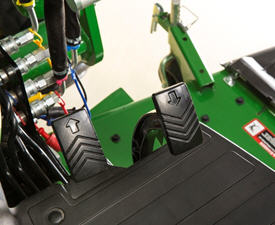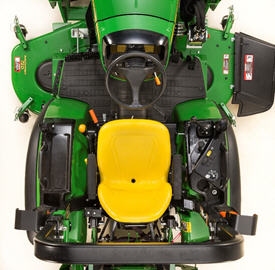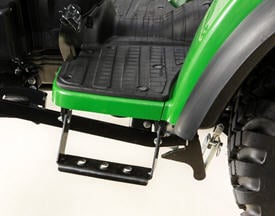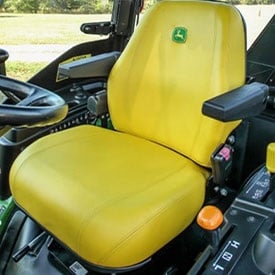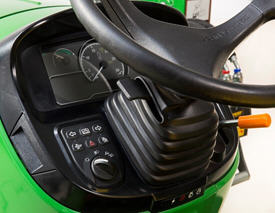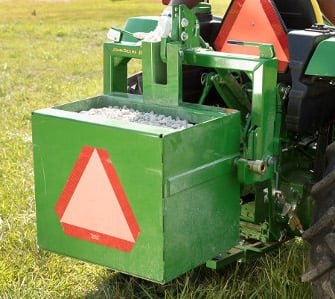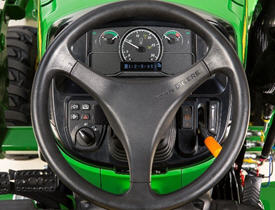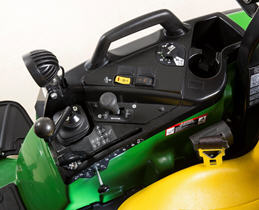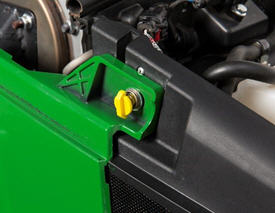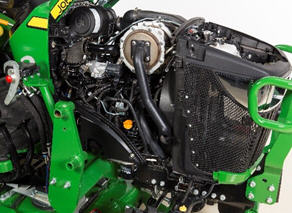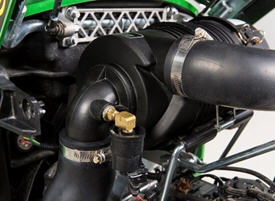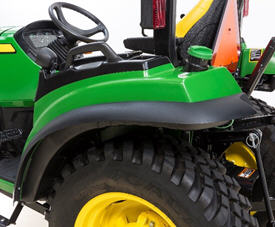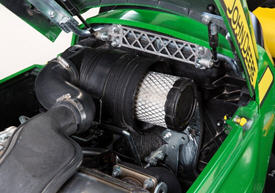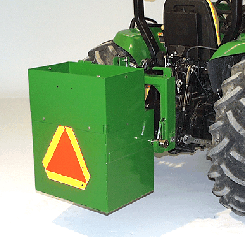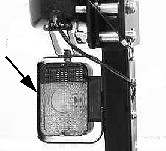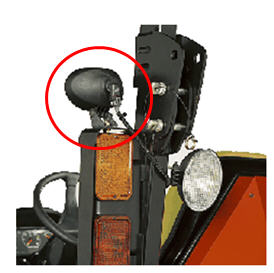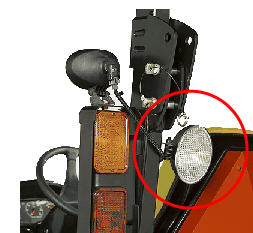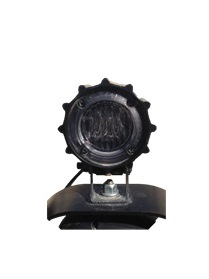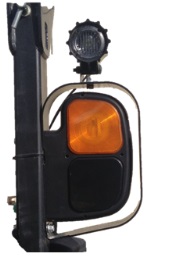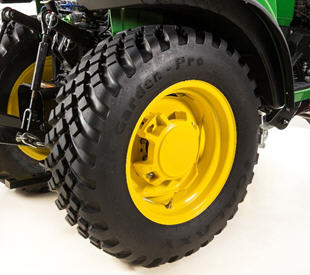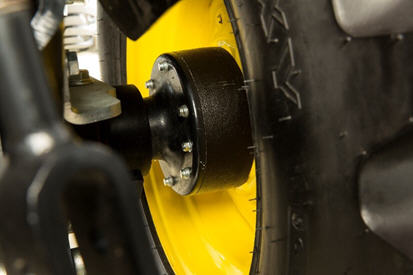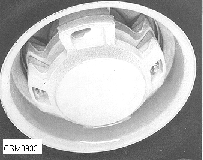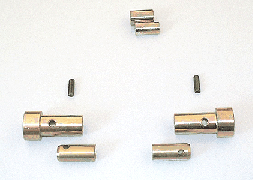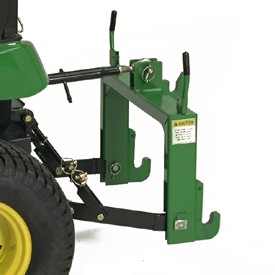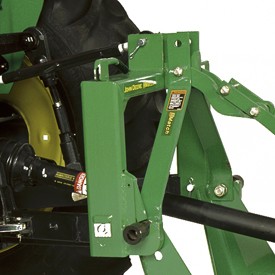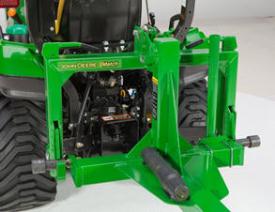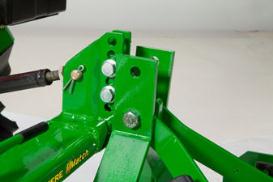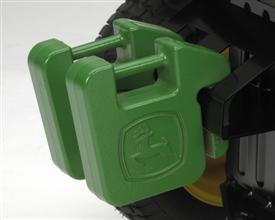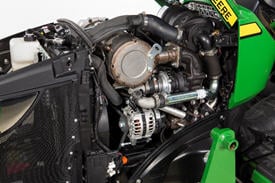 Yanmar 3-cylinder, TNV series diesel engine
Yanmar 3-cylinder, TNV series diesel engine
2032R
The 1.642-L (100.2-cu in.) displacement, liquid-cooled 3TNV88C-NJT Yanmar® diesel engine provides 22.9 kW ( 30.7 hp) to the 2032R.
Model |
Number of cylinders |
Engine displacement |
Aspiration |
Gross engine power* |
Gross engine PS* |
Power take-off (PTO) power* |
2032R |
3 |
1.642 L (110.2 cu in.) |
Natural |
22.9 kW (30.7 hp) |
31.2 PS |
18 kW (24.2 hp) |
*Engine kW (hp), gross SAE J1995: 22.9 (30.7) at 2500 rpm, PS
Displacement, L (cu in).: 1.642 (100.2)
2038R
The 1.568-L (95.8-cu in.) displacement, turbocharged liquid-cooled 3TNV86T-NJT Yanmar diesel engine provides 27.4 kW ( 36.7 hp) to the 2038R.
Model |
Number of cylinders |
Engine displacement |
Aspiration |
Gross engine power* |
Gross engine PS* |
PTO power* |
2038R |
3 |
1.568 L (95.8 cu in.) |
Turbocharged |
27.4 kW (36.7 hp) |
37.2 PS |
22.7 kW (30.4 hp) |
*Engine kW (hp), gross SAE J1995: 27.4 (36.7) at 2500 rpm, PS
Displacement, L (cu in.): 1.568 (95.8)
The engine uses the latest technologies to optimize fuel economy, improve control and accuracy, and reduce environmental impact.
The common rail system (CRS) optimizes fuel economy and reduces operating costs. High-pressure injection atomizes fuel into finer particles which burn more completely. It results in improved fuel economy and a lower cost of operation.
The electronic control unit (ECU) provides optimum fuel control and accuracy. ECU monitors and controls the engine. It continuously monitors engine conditions and adjusts the fuel delivery accordingly to ensure optimum performance and emissions.
The engine comes with an aftertreatment system. The system operates automatically. The exhaust filter consists of a diesel particulate filter (DPF) which captures particulate matter (PM) contained in the exhaust gas. Using a natural cleaning process, most of the PM trapped in the exhaust filter is eliminated by the heat of the exhaust stream generated by normal use. In situations of low temperature, engine speed or load factor, an active cleaning cycle is initiated. In this cleaning cycle, the exhaust gas temperature is raised by injecting additional fuel during the exhaust stroke of normal vehicle operation to the diesel oxidation catalyst (DOC).
After many hours of use, the exhaust filter may require an ash removal service.
DOC/DPF
Depending on the load that the tractor is under, as well as ambient temperature, humidity, and engine speed, the DPF may build up with particulate matter, thus requiring cleaning. Filter cleaning is determined by one of three conditions:
- A prescribed time-based estimation of needed filter cleaning
- DOC/DPF pressure sensors
- A particulate matter buildup estimation based on load conditions
Once one of the three conditions have been met, filter cleaning will occur. There are three different types of filter cleaning processes:
- Passive filter cleaning
- Active filter cleaning
- Parked filter cleaning
Passive filter cleaning
Passive filter cleaning occurs naturally when the engine is generating enough heat to oxidize particulate matter. This automatic process occurs continuously during normal operating conditions. No tractor icons or symbols appear on the display during passive filter cleaning.
NOTE: Passive filter cleaning requires no operator involvement, and there is no interruption to tractor operation.
Active filter cleaning
If conditions (temperature, load, or speed) for passive filter cleaning cannot be achieved, then particulate matter is removed using active filter cleaner.
To achieve the required conditions, exhaust temperature management (ETM) manages the initiation and duration of active filter cleaning. ETM can adjust numerous engine parameters and/or inject a small quantity of fuel into the exhaust stream for a short duration. The fuel turns to vapor and chemically reacts with the catalysts in the DOC to create heat to oxidize particulate matter.
It is important to note that at no time is fuel in the DOC/DPF ignited, and there is no interruption to tractor operation.
Like passive filter cleaning, active filter cleaning requires no operator involvement, and there is no interruption to tractor operation.
Parked filter cleaning
In some instances where passive and active filter cleaning have not fully cleaned the particulate matter from the system, a parked filter cleaning may need to take place. Most likely, the only time a parked filter cleaning will need to occur is when automatic filter cleaning has been disabled for an extended period of time and multiple warnings to engage filter cleaning were ignored or if the tractor has been used during light load conditions. Additionally, when the automatic filter cleaning process has been deliberately interrupted multiple times, or if active filter cleaning has failed numerous times due to a failed component, a parked filter cleaning may be requested. In these rare instances the operator will have to park the tractor and start the filter cleaning process.
The parked filter cleaning process needs to be activated based on usage and operation of the tractor. The process will take approximately 30 minutes. See operator’s manual for more details.
The emissions system on this engine constantly monitors the soot level of the tractor, making sure the tractor is always in peak performance condition. This ensures high performance at all times.
NOTE: Number of hours since last regeneration and soot level percentage viewable on LCD display.
For more information regarding Environmental Protection Agency (EPA) regulations and the technology behind John Deere Integrated Emissions Control systems, click here.
Yanmar TNV Series engine offers these features:
- Economical cast-in-block cylinder design for good cooling and long life
- Direct fuel injection
- Improves starting
- Injects fuel directly on top of pistons for more efficient combustion
- Develops more horsepower per gallon of fuel than indirect injection engines
- Aluminum alloy pistons are lightweight to reduce connecting rod bearing loads and provide good heat transfer characteristics
- Design permits tighter tolerances and neutralizes expansion of the piston, which reduces blow-by and noise from piston slap
- Top rings are higher on the piston and a thinner head gasket is used to greatly reduce the volume of unburned waste gases and increase combustion efficiency
- Timing gears and injector drive gears have a helical profile to reduce engine noise
- Auto-bleed fuel system
- There is no need to prime the system if the tractor runs out of fuel
- The system self-primes the injection pump, lines and injectors, providing fast fuel recovery for easier starting
- High-capacity lubrication system provides filtered oil, under pressure, to all engine bearings for long life
- Fuel filter with replaceable element
- Water separator with additional replaceable filter element
- See-through coolant recovery tank permits operator to check coolant level without removing radiator cap
- Dry-type air cleaner with safety element
- Dual element design for added engine protection
- Air cleaner service indicator is standard equipment on all models and alerts the operator on the instrument panels
- Easy access to engine check and fill points on the right-hand side of the tractor by removing the side panels
Yanmar is a trademark of Yanmar Co., Ltd.



